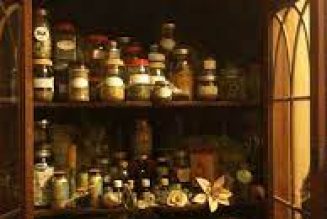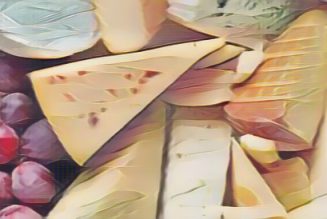There are many uses for herbs in sachets, pot-pourri, pillows and other containers where the herbs may not be visible but release their delicious scents. No one could resist a lovely collection of lacy herb sachets for their cupboards or linens. Most of these ideas are very simple to make, yet are perfect presents for all generations. The sachets and pillows can be varied according to the likes and dislikes of the recipients. Many inexpensive fabrics can be used and then decorated, so none of these ideas need be expensive.
Herbal Pot-Pourri
Pot-pourri is a very traditional aromatic accessory for the home and many recipes have been handed down through the generations. There are several ways to make pot-pourri. The oldest method is for a moist pot-pourri where layers of rose petals, spices and salt are arranged in a large crock and left to rot down for six weeks or more. The strength of scent is excellent but the visual appearance is not good (the salt bleaches out all the color in the rose petals). That is why traditional pot-pourri jars are closed, with holes for the fragrance to waft through.
A prettier finished effect is gained by mixing flowers and herbs with essential oils and a fixative, such as orris root. This is also a fairly lengthy method but the finished effect can be lovely, particularly if some flowers are dried with silica gel and placed on top for decoration.
As most of the projects here are for sachets or other items where the herbs are hidden away behind some fabric, the look of the finished pot-pourri is not of paramount importance. The main point is that the scent should be strong and long-lasting. When making small sachets it helps to use fairly small ingredients of an even size, so there are no unsightly lumps and bulges in the sachets. The best answer for this is to use small sprigs of dried herbs and flowers with a much larger proportion of fixative.
Many recipes call for powdered orris root, but I use cut and sifted orris or blue flag root instead, as I find the powder spoils the outward appearance of pot-pourri. However, as the recipes here are mainly for use on sachets, either powdered or cut orris root will do.
Many of the recipes here can easily be altered to suit whatever ingredients you have available. Once you have made several batches of your own pot-pourri you will become more courageous and want to experiment. It is easy to make up your own recipes, just keep to the basic guidelines on quantities of ingredients.
Orris Root and Oil Mixture
As a general note, I use a measuring jug when measuring out the various dry ingredients, unless they are measured by the spoonful. The orris root is best mixed with the essential oil first and put into a small screw-top jar to mature for a couple of days. If you are intending to make several types of pot-pourri, I would suggest you build up a collection of jars with different orris root and essential oil mixtures which you can use as you wish.
Mix the oil and orris root in the proportions of 4 oz orris root to 1/2 fl oz essential oil. Once it has matured for a couple of days you can use it by the tablespoonful as indicated in the recipes. Make sure that you label the jars clearly, stating the particular essential oil you have used. The collection of orris root/oil jars can then sit in a neat row on your kitchen shelf or worktop, where you can shake them occasionally to encourage the mixing process. Avoid storing them in strong sunlight as it will reduce the strength of the essential oils.
Delicious Mint and Cinnamon Pot-Pourri
1/2 pint cinnamon pieces
1/2 pint mint leaves, crumbled
2 tbsp cinnamon/orris mixture
1 tbsp apple/orris mixture
1/2 tbsp mint/orris mixture
Use a large mixing bowl and mix together all the ingredients. As these recipes are mainly destined for use in sachets, you should break the cinnamon pieces up fairly small. Having mixed it well, turn the mixture into a large jar or polythene bag and seal. Put it away for two to four weeks, shaking it regularly to ensure even distribution of the oil mixtures. Check the smell after two weeks; if the aroma seems satisfactory you can use it, but if not, you should wait another couple of weeks. If you are still not happy with the smell, try adding other orris root/oil mixes until you like the balance of the fragrance.
Lemon Pot-Pourri
1/4 pint lemon verbena leaves
1/4 pint lemon balm leaves
1/4 pint lemon thyme leaves
1/2 pint lemon and orange peel, dried and chopped
1 tbsp bay leaves, crumbled
1/4 pint mint leaves
3 tbsp lemon/orris mixture
2 tbsp neroli (orange blossom)/orris mixture
1 tbsp mint/orris mixture
Mix all the ingredients together in a large mixing bowl and place in a large jar or polythene bag. Seal and put away in a dark place for two to four weeks, shaking occasionally to help the mixing process.
Herbs and Spices Pot-Pourri
1/2 pint ginger root
1/4 pint cinnamon sticks
1/4 pint star anise
3-4 nutmegs, broken
1/4 pint angelica root
6-8 bay leaves
1/4 pint lavender flowers
1/4 pint rosemary
1/2 pint sage leaves
1 tbsp thyme
5 tbsp allspice/orris mixture
3 tbsp cinnamon/orris mixture
1 tbsp thyme/orris mixture
1 tbsp rosemary/orris mixture
Mix all the ingredients together in a large mixing bowl and place in a large jar or polythene bag. Seal and put away in a dark place for two to four weeks, shaking occasionally to help the mixing process.
Herb Garden Harvest
1/4 pint lemon verbena leaves
1/2 pint rosemary leaves
1/2 pint lavender flowers
1/4 pint lemon balm
1 tbsp thyme
1 tbsp crumbled bay leaves
1/4 pint sage leaves
1/2 pint oregano
1/2 pint scented geranium leaves
5 tbsp geranium/orris mixture
4 tsp lavender/orris mixture
1 tbsp rose/orris mixture
Mix all the ingredients together in a large mixing bowl and place in a large jar or polythene bag. Seal and put away in a dark place for two to four weeks, shaking occasionally to help the mixing process.
Spicy Lavender Pot-Pourri
1/2 pint lavender flowers
1/4 pint cornflowers
1/4 pint cloves
1/2 pint crushed cinnamon sticks
1/2 pint pink rose petals
2 tbsp lavender/orris mixture
Mix all the ingredients together in a large mixing bowl and place in a large jar or polythene bag. Seal and put away in a dark place for two to four weeks, shaking occasionally to help the mixing process.
Moth Chaser Sachets
1/4 pint Santolina, crushed
1/4 pint Artemisia
1/4 pint mint leaves
1/4 pint rosemary leaves
5 cinnamon sticks, crushed
1/4 pint cloves
1/4 pint lemon peel, dried and chopped
1/4 pint lemon-scented geranium leaves
3 tbsp lavender/orris mixture
3 tbsp clove/orris mixture
2 tbsp lemon/orris mixture
Mix all the ingredients together in a large mixing bowl and place in a large jar or polythene bag. Seal and put away in a dark place for two to four weeks, shaking occasionally to help the mixing process. Use in sachets that can be hung in cupboards or laid in drawers to ward off fierce moths.
Christmas Sachet Mix
1/2 pint pine needles
1/2 pint conifer leaves
1/4 pint bay leaves, crushed
1/4 pint eucalyptus leaves, crushed
1/2 pint orange peel, dried and chopped
1/4 pint cinnamon sticks, chopped
1/4 pint allspice berries
5 tbsp pine/orris mixture
3 tbsp orange/orris mixture
2 tbsp allspice/orris mixture
Mix all the ingredients together in a large mixing bowl and place in a large jar or polythene bag. Seal and put away in a dark place for two to four weeks, shaking occasionally to help the mixing process.
Hop Pillows
For centuries, hop pillows have been popular remedies for combating insomnia and promoting restful sleep. Originally, mattresses would have been filled with grasses and herbs, which is why the plant Galiumordorata is commonly known as ‘ladies bedstraw’ or ‘hedge bedstraw’. From there we progressed to stuffing pillows and mattresses with down and horsehair, but the smell of the grasses was replaced by an herbal pillow. During the Victorian era, herb pillows were much favored, particularly ones made from lavender and roses.
Although it is traditional to slip herb pillows into the main pillowcase and therefore keep them out of sight, they look best when decorated with plenty of lace and ribbons, especially if you are giving them as a present.
Many fabrics can be used for making pillows, ranging from plain calico that can be slipped into the main pillowcase to antique linens and lace that give a really luxurious effect and deserve to be left on show. The two most popular scents for inducing sleep are hops and lavender, but these fragrances do not blend well together so choose one or the other. Both of these recipes smell heavenly and will help you drift off into scented sleep.
Sweet Hop and Spice Mix
2 pints dried hops
2 tbsp allspice
2 tbsp orange peel, dried
2 tbsp lemon balm leaves
1 tbsp allspice/orris mixture
1 tbsp neroli (orange blossom)/orris mixture
Mix all the ingredients together in a large mixing bowl and place in a large jar or polythene bag. Seal and put away in a dark place for two to four weeks, shaking occasionally to help the mixing process.
Victorian Flower Sleep Mix
3/4 pint dark red or pink scented rose petals
1/2 pint elderflowers
1/2 pint lavender flowers
1/4 pint rosemary leaves (they keep away evil spirits!)
5 tbsp rose/orris mixture
3 tbsp lavender/orris mixture
Mix all the ingredients together in a large mixing bowl and place in a large jar or polythene bag. Seal and put away in a dark place for two to four weeks, shaking occasionally to help the mixing process.
Making a Hop Pillow
To make a hop pillow, you will need the following ingredients:
1/2 yard muslin
Sweet Hop and Spice Mix
1/2 yard plain or patterned cotton lace or ribbons
Cut out two pieces of muslin, each approximately 14×12 inches and machine or sew by hand around three sides. Turn right sides out and fill with the hop mix, then stitch up the fourth side firmly by hand. Now cut out two pieces of the cotton, slightly larger than the muslin and allowing extra for seams approximately 16×14 inches. Placing right sides together, machine sew around three sides, incorporating the lace if you wish at this stage. Turn right sides out, then turn under the seam allowance on the fourth side and place the hop pillow inside. Finish the last edge by hand with neat oversewing stitches. You can then decorate the pillow with lace or ribbons.
When the fragrance of the hop pillow begins to fade, all you have to do is remove the inner filling, replace the hop mix with a new batch and then sew up the pillow again. This is quicker and easier than having to replace loose contents in the cotton pillow.
Handkerchief Pillow
The easiest way of all to make a pretty square sleep pillow is to use pretty lace-edged handkerchiefs. Most of the work is done for you then, and a pretty pillow can be made in a very short time.
You will need:
4 lace-edged handkerchiefs
1/2 yard plain white cotton lawn or cotton
1/2 yard muslin
Join the four handkerchiefs together in a square by oversewing the edges or using a zigzag stitch on a sewing machine. Cut the cotton backing to the same size as the square of four handkerchiefs and then turn in the edges by the depth of the lace so the square fits the fabric area of the four handkerchiefs. Machine-stitch around three sides of the fabric, leaving the lace free and one side open. Make a square muslin pillow as described for the hop pillow and fill with any of the sachet mixes, the Victorian flowers mix might be the most suitable. Insert the muslin pad and close the pillow with small slip stitches. You can decorate the top of the cushion with some ribbon bows if you wish.
Small Perfumed Sachets
Smaller sachets have many uses; they can be tucked in drawers and cupboards, or used to scent linen cupboards or lingerie. There is nothing more glamorous than a drawer that exudes a lovely floral aroma whenever it is opened. Desks can benefit from sharper scents if work has to go on through the night, a sachet filled with basil to relieve tiredness, or cardamom to help concentration, might be appropriate.
To sleep in bedlinen scented with the sweet smell of lavender has long been a luxury. The easiest way to make little sachets to give as presents, or to use yourself, is to buy a collection of pretty lace-edged handkerchiefs. Place a couple of tablespoons of one of the mixtures in the center of each handkerchief, gather up the edges and tie with pretty ribbons to make an elegant and fragrant bundle.
If you wish to use a printed or plain fabric, you can cut out two pieces of fabric of the size you require, with a small allowance for seams. Sew around three sides of the main sachet and similarly on two slightly smaller pieces of muslin. Turn the muslin right sides out, fill with pot-pourri and sew up the fourth edge by hand. Turn the cotton sachet right sides out, insert the muslin sachet and sew up the fourth edge by hand. It is not essential to make the muslin liner but it does save time when renewing the sachet as you can throw away the old sachet and replace it with a new one. A liner also reduces the likelihood of the oils staining the outer cover.
Padded Coat Hangers with Fragrant Sachets
Another luxury with a practical purpose is a padded coat hanger that has a matching sachet hanging from its center. Padded hangers are much kinder to clothes than ordinary wire ones and are less likely to leave hanger marks on delicate fabrics. The sachet can be hung inside the article of clothing, making it fresh and fragrant the next time it is worn. You can either use a flowery pot-pourri mix or the moth chaser recipe, which will keep away moths and help to protect woolen clothing in particular.
You will need:
6 wooden coat hangers
1/2 yard wadding
1/2 yard printed cotton
2 yards 1/2-inch wide ribbon
matching cotton
extra ribbon for bows
Cut a strip of wadding 36×2 inches and wind it around a coat hanger, stitching it securely at each end. To cover the hook, fold 1 inch of ribbon over at the end and then bind the remaining ribbon tightly all the way down the hook. Stitch the end of the ribbon to the wadding at the base of the hook, then cut off the surplus ribbon.
Cut out a piece of the fabric about 4 3/4 inches wide and slightly longer than the hanger, then fold it in half lengthwise with the right sides together. Stitch across both short ends. Turn to the right side. Neaten the raw edges on the long sides by folding the seam allowance over and pressing or tacking it into position. Press a crease line along the bottom of the casing.
Place the wadding-wrapped hanger inside the fabric casing, with the open edges along the top of the hanger. Pin in position while working. Join the seam edges with running stitch, leaving the cotton loose at the end. Also sew running stitches along the bottom crease and again leave the cotton loose at the end. Pull both ends of the hanging threads to form gathers all along the hanger, then secure the threads tightly. The hanger can now be decorated with a large or small bow. Make a matching sachet in the same way as for the small perfumed sachets, then hang it from the hook with some ribbon or lace.
Gentleman’s Mix
Most pot-pourri and sachet mixes are rather too feminine for a man’s wardrobe. So here is a mix that would suit most men and might appeal to some ladies as well!
1/4 pint lemon verbena leaves
1 tbsp mint leaves
1 tbsp cloves
1 tbsp rosemary
1/4 pint raspberry leaves
1 tbsp lemon/orris mixture
1 tbsp mint/orris mixture
1 tbsp oregano/orris mixture
Mix all the ingredients together in a large mixing bowl and place in a large jar or polythene bag. Seal and put away in a dark place for two to four weeks, shaking occasionally to help the mixing process.






















